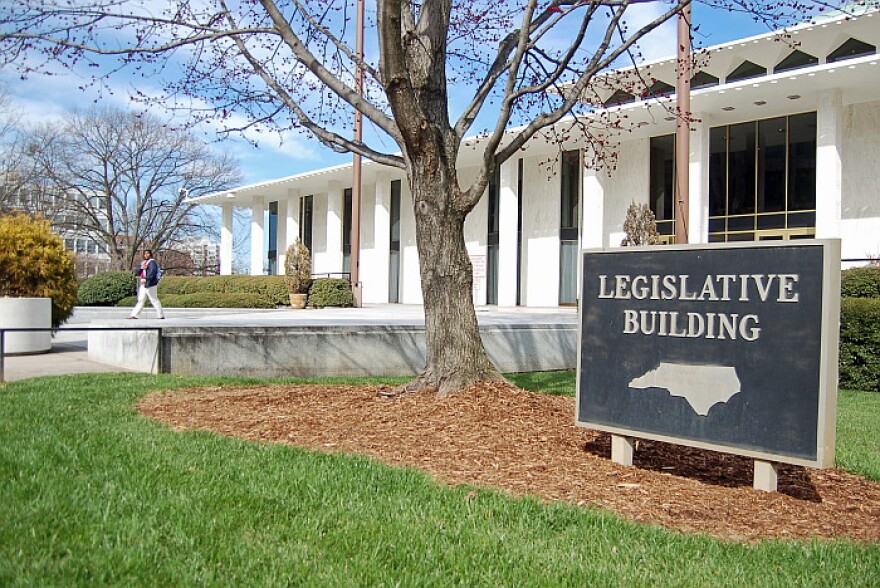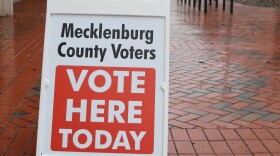Republicans in the state Senate have pushed through elections legislation that could radically alter voting rules in North Carolina.
One bill would require more documentation for same-day registration during the one-stop, early voting period. That legislation would also do away with a three-day grace period for receiving mail-in ballots postmarked by Election Day.
Backers of the GOP measures say the legislation will bolster eroding public confidence over elections.
"Everybody knows what Election Day is, it's when the votes are in, when the counting begins," said state Sen. Warren Daniel, a Republican, explaining his bill to the chamber ahead of the party-line vote. "And every day that passes after Election Day with votes still coming in creates the possibility of distrust in the process."
What Daniel and his fellow party members — not to mention conspiracy theorists — fail to mention when they push bills aimed at tightening voting rules in the name of election integrity, is that voter fraud rarely occurs and, as the painstaking process of certifying elections shows year after year, has virtually no impact on election outcomes.
Grace period pressure
Also, under federal law, mail-in ballots from U.S. citizens and military personnel overseas have a nine-day grace period, so there will always be valid votes coming in after Election Day. And results still will not be official until completion of the statutorily required post-election audit, which includes hand-to-eye counts of ballots from randomly selected precincts in each county and culminates in the canvass when outcomes are certified 10 days after an election.
Republican antipathy for the three-day grace period is rooted in their anger over a 2020 legal settlement North Carolina's Democratic Attorney General, Josh Stein, along with the governor-appointed state elections board, entered with voting rights advocates who sued for easing ballot access amid the COVID-19 pandemic.
The settlement resulted in an extension of the grace period by an extra six days; it also attempted to allow voters whose mail-in ballots did not contain the proper witness information to correct those errors by affidavit. A federal court upheld the grace period extension but said doing away with the witness requirement was an unconstitutional circumvention of legislative authority.
Still, as Daniel noted in his remarks supporting the legislation, 30 other states, including ones led by Democrats, have Election Day as the deadline for receiving mail-in ballots. And Daniel insisted that joining them would increase confidence in North Carolina's elections.
"This confidence was greatly undermined during the 2020 election when our attorney general and Director of the Board of Elections Ms. [Karen] Brinson Bell, entered into a collusive settlement that subverted state law to extend the absentee ballot deadline from three days after the election to nine days after Election Day," Daniel claimed.
But ire over the 2020 settlement is no reason to change a law — the three-day grace period — that has been in place since 2009, according to state Sen. Natasha Marcus, a Mecklenburg Democrat.
"It's not fair to blame voters for the speed of the postal service and to have their right to vote determined based on that," Marcus argued.
She warned that valid votes would be thrown out through no fault of voters, adding: "Come illness, hurricane, hell or high water, it won't matter why your ballot got held up in the mail."
Debate over disinformation
Marcus and other Democrats have accused Republicans behind the legislation of subscribing to the wave of disinformation about the 2020 presidential election pushed by former Pres. Donald Trump and his acolytes. It has not helped Republicans that North Carolina-based attorney Cleta Mitchell met with GOP lawmakers as they worked on these bills.
Mitchell is infamous for playing a role in trying to get Georgia elections officials to unearth enough votes for Trump to overturn the legitimate outcome of the 2020 presidential election.
"We run secure, safe, efficient elections here in North Carolina, no matter what Trump and his lawyers say," Marcus concluded in her floor debate on Wednesday evening.
The omnibus elections bill also would also loosen rules around challenging absentee ballots. Under current law, a voter may only challenge absentee ballots cast in their precinct. The proposed legislation would allow voters to challenge other voters' absentee ballots anywhere in their county, which critics say is a recipe for bogus claims of fraud.
The Senate's Republican majority also passed a bill that would restructure the North Carolina State Board of Elections.
Now, it's a five-member body, where governors get to appoint a potentially tie-breaking fifth member from their party. The GOP bill would make it an eight-member body with two members each appointed by the House and Senate minority and majority leaders.
But the new measure would send deadlocked votes on appointing an elections board chairman and executive director to the legislature.
Lawmakers on both sides of the aisle agree that if and when the bill becomes law it will be headed for a court challenge over constitutional questions about separation of power between the executive and legislative branches.
The last time Republican lawmakers tried to seize appointment control over the elections board — back in late 2016, just before Democrat Roy Cooper was to take office as governor — a court ultimately found the legislation to be unconstitutional and returned the law to its current state.







